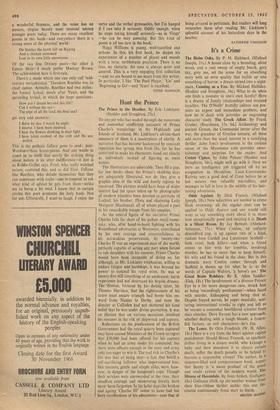It's a Crime
The Holm Oaks. By P. M. Hubbard. (Michael Joseph, 21s.) A house close by a brooding, silent wood, and a vast sweep of empty beach, grey. sky, grey sea, set the scene for an absorbing story with an eerie quality that builds up' into something of horror, a dream turned into a night- mare. Cunning as a Fox. By Michael Halliday. (Hodder and Stoughton, 16s.) What to do when one finds a monster in one's own family? Here is a drama of family relationships and strained loyalties. The O'Neills' brutally callous son pre- sents an urgent and immediate problem, and how he is dealt with provides an engrossing character study. The Greek Affair. By Frank Gruber. (Boardman, 13s. 6d.) Archaeology and ancient Greece, the Communist terror after the war, the grandeur of Grecian scenery, all these add more than the usual interest to a satisfying thriller. John Ives's involvement in the curious secret of the Mycenman coin provides enter- tainment and surprises for the reader. And Cretan Cipher, by John Palmer (Hodder and Stoughton, 16s.), might well go with it. Here we have an intelligence job triggered off by an assignation in Heraklion. Lieut.-Commander Rattray sees a good deal of Crete before he at last secures two valuable microfilms, and manages to fall in love in the middle of his hair- raising adventures.
Odds Against. By Dick Francis. (Michael Joseph, 18s.) New adjectives are needed in crime book reviewing: all the regular ones can be applied to Odds Against and one would still want to say something more about it to stres,, how exceptionally good and exciting it is. Death is a Silent Room. By Jay Bennett. (Abelard- Schuman, 15s.) When Conlon, an unfairly discredited cop, is up against two of a kind, rackets boss Cardell and Lieutenant Scofield-- both cruel, both killers--and when a friend comes to him with her troubles, involving murder, he has to move fast to keep himself, his wife and his friend in the clear. But in this dramatic story Conlon comes through and Scofield is shown up for what he is—in the words of Captain Walters, `a horse's ass.' The Great Brain Robbery. By K. Allen Saddler. (Elek, 18s.) The involvement of a divorce Private Eye in a far more dangerous case, struck him as being 'exceedingly posthumous'—when faced with murder, kidnapping and being shot at. Despite frayed nerves, he copes manfully, scat- tering international crooks° to right and left as he rescues a somewhat bewildered scientist from their clutches. Dave Stevens has a new approach. whether dealing with a tough blonde, a frozen- fish factory, or evil characters—he's fun.
The Loner. By Otto Friedrich. (W. H. Allen, 18s.) Here is a cry from the heart against capital punishment. Should Benny Franzek, an apathetic drifter living in a dream world, who kidnaps.g
baby and then abandons it to almost certain death, suffer the death penalty or be helped to
become a responsible citizen? The author, in a
suspense-filled and compassionate book, argues that Benny is 'a waste product' cf the greed
and credit system of the modern world. Tiec Silence of Herondale. By Joan Aitken. (Gollancz, 18s.) Gollancz chalk up yet another winner from their blue-ribbon thriller stable: this one fas- cinates continuously from start to finish.
MISTER MAKEI°






































 Previous page
Previous page